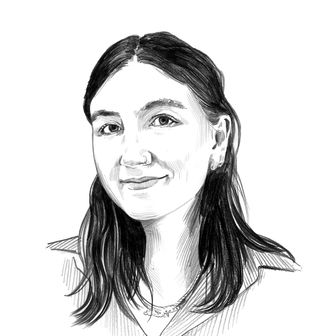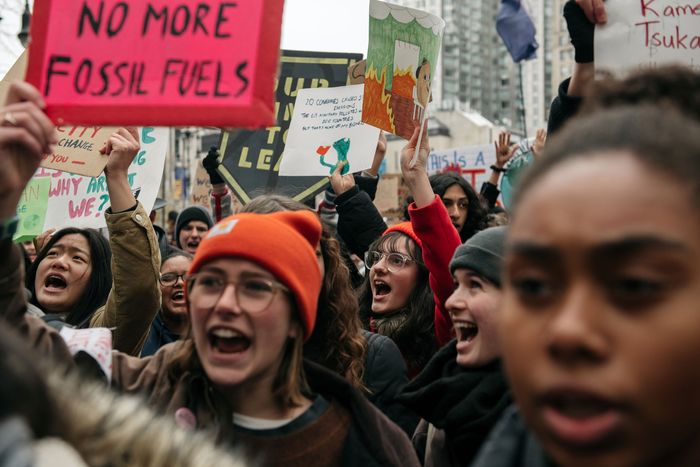
In 2017, Lauren Singer, better known as @trashisfortossers, posted a YouTube video in which she showed every piece of trash she had used over the past four years. It all fit into a single 16-ounce Mason jar. She was living zero-waste, which at that time — my senior year of high school — was unheard of. Or at least, well outside the mainstream.
Watching Singer go through her minimal trash was a transformative adolescent experience, like listening to the 1975 for the first time. I was in. I believed. It sent me spiraling down into a world of environmentalism I never knew existed. Thus I, in all my 18-year-old earnestness, began my journey.
I had to watch the documentary Cowspiracy for a science class. I started slowly transitioning away from eating meat after learning how animal agriculture makes up around 16 percent of human-made greenhouse-gas emissions. Soon I began eating a vegan diet in my Texan hometown, a San Antonio suburb where Whataburger and IHOP were the cool after-school hangout spots for teenagers.
My mom, who grew up on a cattle farm in Minnesota, was displeased, to put it lightly. My parents had indoctrinated the idea that a glass of milk with dinner made for strong bones, and until I was a teenager, I drank one every night. I remember once, after a volleyball game, my teammate’s mom brought food for everyone. She turned to me and said, “I didn’t bring you a snack, but there’s some grass outside.” This was pre-mainstream veganism — before Starbucks started offering oat milk or most grocery stores stocked Beyond Meat. But I wasn’t deterred.
I had been sold the idea that I could change the world with my individual habits, like limiting my plastic use, shopping secondhand, and using “natural” products. And I bought it wholeheartedly. Like all young adolescents must, I was figuring out my own values and what it meant to act on them. I genuinely believed that reducing my carbon output and practicing sustainability would save the Earth. And those values became a huge part of my life, not to mention my sense of self.
When veganism and sustainability entered the Zeitgeist in early 2018, I became even more optimistic. And there was reason to be — it felt like the world was finally catching up. That same year, Greta Thunberg made national headlines for protesting outside the Swedish Parliament for climate action. The then-15-year-old’s actions morphed into a global movement of young people fighting for their planet’s future.
Youth-led movements were everywhere, as March for Our Lives had emerged in response to the Marjory Stoneman Douglas High School shooting. I witnessed my peers rally behind the most racially diverse selection of 2020 Democratic candidates, featuring six women and the first openly gay candidate, as they fought for the presidential nomination. I participated in the marches for Black Lives Matter in the summer of 2020.
And in response? I watched as our young gun-control advocates were harassed by institutional politicians who did very little to tighten gun-control legislation. We saw people dismiss climate change as a hoax, even as a deadly freeze gripped my home state of Texas, where I had spent upwards of 12 years of my life without a single snowfall. We watched as police continued to harass, abuse, and kill Black and brown Americans, and saw the least exciting candidate clinch the 2020 Democratic nomination.
My post-adolescent idealistic phase came crashing down around me, and rightly so. I had always been hopeful, always felt that there was something I could do to help fix things, and always avoided cynicism. But when my trust that those in charge would create change diminished, it did so completely. And it was a little bit of a relief. I don’t think I’ve been alone in feeling as if I were carrying the weight of our planet’s future on my shoulders. If that sounds familiar to you: Just take it off. Take a break.
I spent so long interrogating my personal actions that I began to resent the very things I once enjoyed, the values that once kept me going. I avoided late-night pizza with my friends, even when I wanted to eat a slice, because the guilt I felt after was too overwhelming. I pouted in the corner at Zara and Urban Outfitters while my friends browsed. I spent hours in vintage stores looking for something I knew I wanted from & Other Stories (a very specifically designed sweater I swore I could thrift). I hoarded plastic forks and knives I received with takeout and delivery until that tiny drawer in my tiny kitchen overflowed and I realized I had to dispose of them. But my building didn’t even recycle.
I held myself to a standard I could not sustain, and honestly, I no longer wanted to try. I saw, more and more, how we were willing — happy, even — to take actions on a personal level and receive nothing in return, while the same was not true for the ones that were causing the most harm.
In early 2019, when YouTube videos with titles like “Why I’m no longer vegan,” started popping up, I knew I wasn’t the only one feeling this way. Most of the time they cited diet reasons, but that didn’t change the fact that they shared the news quietly and defensively, like they had failed and let everyone down. I know my friends feel it too, when I ask them where their cute jeans are from and they look around before responding, “Zara, but don’t tell anyone,” or, “H&M, don’t judge me.”
At this point, Lauren Singer has been living zero-waste for ten years. Somehow, she remains optimistic. She said what I expected someone in the sustainability business to say, shared banal platitudes on optimism and change. But she also managed to provide me with validation, if not comfort: “It’s okay to be burned-out. It’s okay to feel shitty. It makes perfect sense.” Then she asked me, “What do you want to see?” It caught me off guard.
I told her: I want an acknowledgment from the 90 companies that are responsible for 75 percent of carbon emissions, according to a 2017 Climactic Change study. They’re the companies you’d expect, like ExxonMobil, BP, and Saudi Aramco, and unsurprisingly, three of the top-ten emitters are government-owned. Just looking at Exxon and its public messaging over the years, we can trace how its PR has deflected its own environmental impact by making the conversation about the consumer and practices they can do to protect the environment.
So what can a single person do when warned that we have eight years left to reverse climate change? I eat very little meat. I vote for elected officials who commit to saving the environment. I shop secondhand as much as possible. I donate in support of local grassroots movements.
I’m disappointed and exhausted, but I still care. I’m just tired of being expected to care. This doesn’t mean I stop fighting. But I’ve given myself a break. I want more from those who can actually create a meaningful change when it comes to saving the environment — and I know I’m not alone.






